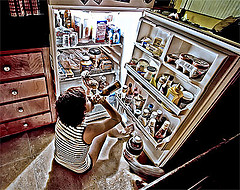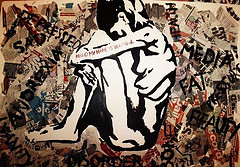Binge Eating Disorder: As Real As It Gets

Why the stigma against this particular eating disorder? The majority of the backlash can be credited to the misunderstandings that prevail about the disorder.
READ ALSO: Eating Disorders: A Growing Problem On College Campuses
The clinical definition of binge eating disorder is "recurring episodes of eating significantly more food in a short period of time than most people would eat under similar circumstances, with episodes marked by feelings of lack of control."
The fact that binging is the most common eating disorder is not surprising. Binging, in the colloquial term, is somewhat commonplace. Many of us are guilty of eating past the point of fullness, leading to the ever-familiar “food coma." In all likelihood, the agonizing feelings of regret afterwards will not prevent it from happening again in the future.
Emotional eating is also very much built into our culture, making binge eating disorder even more prone to missunderstandings. From the first time as a little kid that you learn that throwing a hissy fit in the grocery store earns you a candy bar in the checkout line, to the first time your heart gets broken by a boy and your mom takes you out for ice cream, it is ingrained in us that food and emotions are often tied together.
Moreover, emotional eating is not always a bad thing; I would argue that any female above the age of thirteen would agree that there is even a certain time of the month where it is wholly necessary.
What is important, however, is to draw a distinction between over-eating and having binge eating disorder, which is a serious condition that can result in anxiety and depression, negatively pervading all aspects of a person’s life.
An anonymous USC female diagnosed with the disorder describes the psychological inner turmoil that occurs with each binge:
“The thing about binging is that it isn’t even about the food.
"At first, maybe it is," said anonymous USC student. "Maybe you’re even actually hungry… more likely, you’re not. You need a salt fix. You need the saccharine sweetness to coat your teeth, and you want your tongue to tingle with flavors here, there, and everywhere. And maybe, with those first few bites, you achieve that goal. Everything tastes as amazing as you wanted it to. The endorphins flood your head and you eat faster and faster, just to keep it coming.
"But soon–sooner than you think–each bite gets blander and grayer. Each bite has just a little less of what you were looking for. And suddenly, you’re desperately shoving food down your throat, just to taste it again. Just to feel that rush again. Just to feel anything worth feeling.
"And then you realize that you aren’t eating because your body wants to fill your empty stomach. You’re eating because you want to fill your empty soul. And no matter how much you put inside, no matter how to close to making yourself physically ill you get, no matter how disgusting each bite becomes, you keep going. And you never feel full.”
READ ALSO: Orthorexia: A "Healthy Eating" Disorder?
Binge eating disorder is debilitating: physically, mentally, and emotionally.
It is not merely an attempt to justify overeating. It is every bit as real of a disorder as anorexia and bulimia.
Patrice Barber M.D., registered dietician at the USC Engemann Student Health Center, explains that eating disorders are not really about the food, but rather, what the food is being used to supply. "Whether it is restricting, binging, or binging and purging, the feeling inside can be exactly the same," said Barber. She continues to explain that the cause is never physical hunger alone; there is always an emotional component.
Barber further distinguishes binge eating disorder by the guilt associated with the act, and notes that the act is usually done in isolation.

I would argue that the insensitivity towards binge eating disorder stems from our skewed ideals, and issues of fat shaming embedded within our culture. The fact that "more than 69 percent of America’s population is overweight and 35 percent" are obese" does little to diminish the negative stigma. We exhibit mistrust and disgust for those diagnosed with a binge eating disorder, who give into the gluttony of food and inevtiable weight gain, yet feel pity for anorexics or bulimics, who take efforts to control their weight.
Do we in some ways envy those with other eating disorders because they may have the body we covet, but are not willing to go to the means to achieve? This theory would explain why we regard bulimia more gently than binge eating disorder, though both are virtually the same disorder, with binge eating excluding the element of purging.
Not only do the afflicted have to deal with prejudice for having the disorder, but also the additional discrimination that comes with possessing a trait society deems undesirable. People need to recognize that "binge eating disorder is not about willpower, gluttony or slothfulness," but instead usually it has a serious internal cause such as emotional or physical trauma.
Furthermore, it is impossible to ascertain whether or not a person has binge eating disorder from their physical appearance. According to the Huffington Post, although some afflicted with binge eating disorder are actually overweight or obese, the truth of the matter is that the majority are actually of a normal body weight. Assuming a person who is overweight or obese has the disorder is both naïve and insulting.
Fat shaming will not fix the obesity problem in our country, nor will it help those afflicted with eating disorders. "Shame supports name-calling, accuses self-blame despite innocence, and holds us responsible for others’ shortcomings," which perpetuates an ongoing judgment of self.
This shame is then displaced. The Kripalu Center for Yoga and Health explains how eating disorder symptoms, in whatever form, are actually distortions of this initial shame, which is put into the body and recycled into criticism of the body and obsession with food in the mind.
The process is entirely counterproductive, causing thoughts to be hypothesized solely in either/or terms: "There is good and bad, right and wrong, thin and fat, and nothing in between. 'I feel so fat' draws attention toward weight loss rather than an exploration of distressing feelings." To recover from an eating disorder, or to lose weight, the drive must first come from within; the internal torment must be expelled and replaced with forgiveness.
We need to change the way in which we percieve those with eating disorders, acquiesing our anorexia envy and unmasked repulsion of the overweight. The fact of the matter is that all eating disorders are characterized by feelings of inadequacy, associating food with rewards and punishment, and psychological torment. To avoid being hypocrites, we must carefully consider our own biases before placing judgment.
READ ALSO: Stay Healthy And Happy In College: Nutrition Tips
Reach Staff Contributor Corinne Osnos here.



